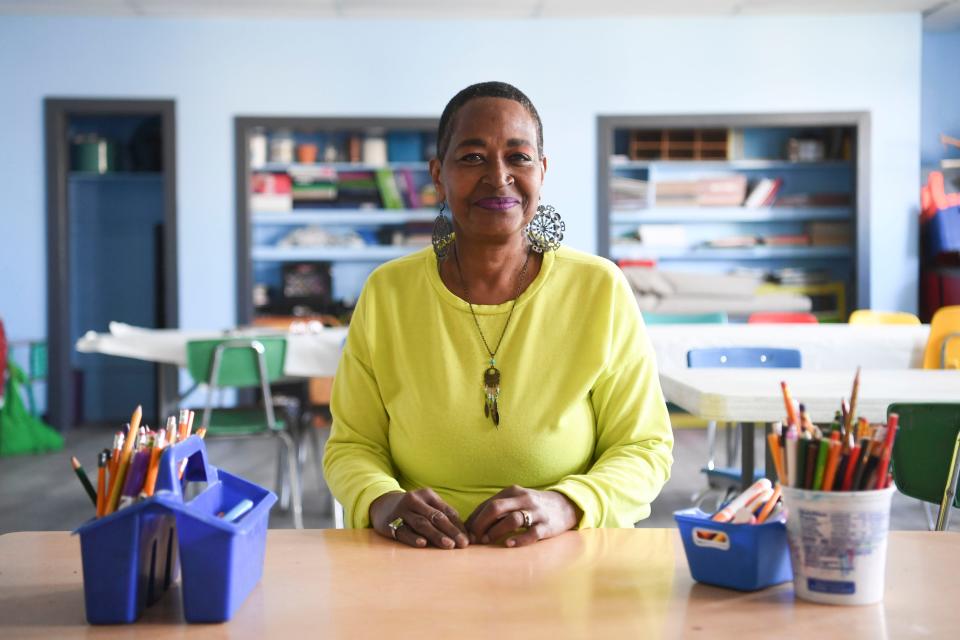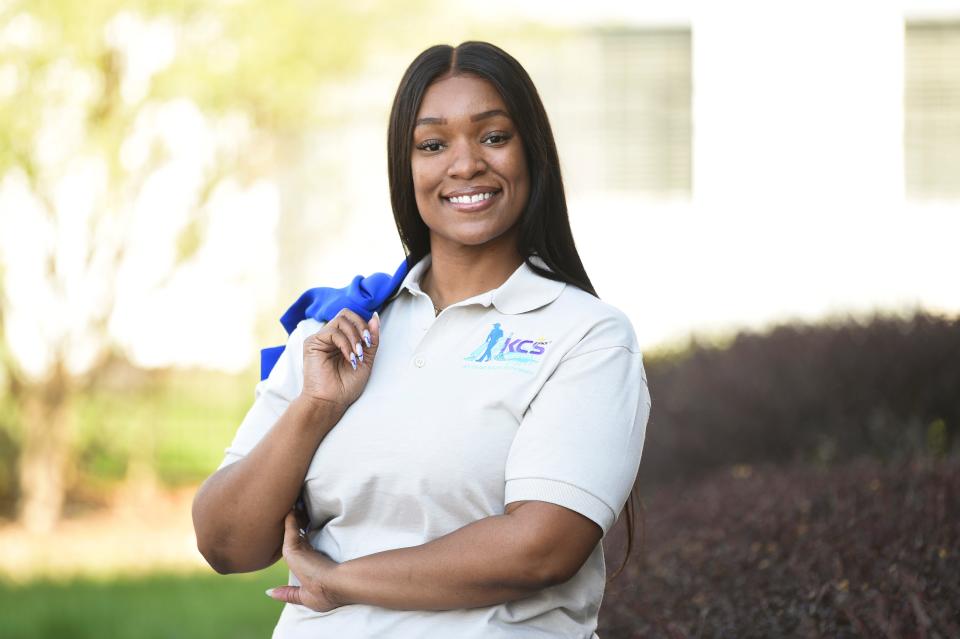'Lifeblood': Black-owned businesses are more than just an economic boost to Knoxville
What does a single Black-owned business mean to the community?
The ripple effects of successful Black businesses go far beyond contribution to the local economy. For starters, they create jobs, help Black families pass on wealth and send kids to college.
They are the "lifeline and lifeblood" of the local Black community, said Terrence Carter, vice president of economic and business development at the Knoxville Area Urban League.
They benefit the entire economy. Black-owned businesses contribute nearly $40 million in annual wages and around $90 million in annual revenue to Knox County, according to the most recent U.S. Census data.
Most are small firms that are closer to the people and the issues on the ground, and Carter encourages large businesses to partner with them for mutual benefit.
"I think people don't give enough value to how much they contribute to the tax base," Carter told Knox News. "Every small business that exists in a minority community, we ought to be helping them grow in scale, because it's good for the total economy, large companies as well as the small minority companies."
Still, there are far fewer Black-owned businesses than there should be.
If the number of Black-owned businesses with paid employees was proportionate to the county's Black population, there would be around 800. Instead, there are only around 93 in Knox County.
It's critical to support Black-owned businesses. That's why Knox News is presenting its third "Black in Business" project celebrating just a few of these thriving companies. These businesses are creating opportunities and closing the racial wealth gap in a region with a high poverty rate among Black residents.
Check out profiles and photos of this year's Black in Business businesses:
"You're pulling in others in the community to work for you, so you're also lifting them up. It extends out so many different ways," said Pamela Cotham, who leads the city of Knoxville's efforts to contract with more diverse businesses. "It's a trickle down effect on the economy, on their life, on the neighborhood and community."
The disproportionately small number of Black-owned business has inspired several organizations and entrepreneurs to drive the data in the other direction – lifting up the Black community and the local economy along the way.
Disparities led to Black entrepreneurs program
In March 2021, the Knoxville Entrepreneur Center launched 100Knoxville, a program that provides five Black business owners with mentors during an intensive five-week course. Each business receives $5,000 thanks to a partnership with Bank of America.
The program was inspired by the 800 Initiative in Memphis. Both are named for the estimated number of Black-owned businesses in each city and each have revenue growth goals. The 100Knoxville program seeks to increase Black business revenue by $10 million in five years.
Jim Biggs, executive director of the Knoxville Entrepreneur Center, said the center wanted to start the program after examining data on local business disparities. While the average annual revenue for all white-owned Knoxville businesses was $574,000, that number was around $65,000 for all Black-owned businesses, Biggs said.
In the data, which Biggs said was from the 2013 U.S. Census, Black-owned businesses had lower revenue than all other racial groups.
While the center works with all kinds of entrepreneurs, they saw a unique opportunity for Black-owned businesses.
"The wealth gap was being driven by the fact that there weren't enough Black-owned firms and they were struggling to find the same customer base and to have the same employee opportunities as other firms," Biggs said. "Ultimately, we want Black entrepreneurs to be leading the entrepreneurial community and inspiring others to follow in their footsteps."
After eight cohorts, 100Knoxville has had 38 graduates who saw an average 21.5% revenue increase, including those who had recently graduated. Graduates have received $190,000 in public and private investments, according to the program's 2023 annual report.
Jackie Holloway, executive director of nonprofit Canvas Can Do Miracles, is among the graduates of 100Knoxville. Her nonprofit provides free art classes for at-risk youth and adults and promotes Black artists in Knoxville through art exhibitions and competitions.

The 100Knoxville program gave her access to networking opportunities that have helped grow the nonprofit. Holloway's training is in business, and she said she didn't have all the skills necessary to run a nonprofit. Through 100Knoxville, Canvas Can Do Miracles has been able to hire a grant writer.
"We've leaped from grassroots to being a viable nonprofit," Holloway said. "We're excited about the changes we see. It's hard work in the beginning, but it's going to pay off, I'm sure of it."
Like in the business world, the local art world has disparities. When Holloway did research into how many Black artists were showing work in local galleries and competitions, she said it was "staggering" to see their underrepresentation. She hopes to change that.
"We found that Black artists in Knoxville are almost obsolete, especially in gallery showings and installations," Holloway said. "We're exposing the whole community to Black artists. I see in five years making Knoxville an art city, a Black art city, that you know in the South, you can come to Knoxville and see quality Black art."
Knoxville Area Urban League opens doors for Black-owned businesses
Many entrepreneurs struggle to get small business loans that could get their company off the ground.
The Knoxville Area Urban League, an affiliate of the National Urban League, provides loans to minority businesses ranging from $5,000 to $250,000, said Carter, the organization's vice president of economic and business development.
It's not the only program that gives loans to minority small businesses. In partnership with the Knoxville Chamber, Pathway Lending created the $6 million 865 Opportunity Fund loan program in 2023. The fund was created to provide access to loans between $5,000 and $50,000 for small businesses in the 865 area code, especially women and minority-owned businesses.
But access to capital is not the full story, or even the most critical challenge facing Black-owned businesses, Carter said. Without a clear business plan, capital can be more of a curse than a blessing.
"We have capital, we do make loans, we just need people to be ready and prepared and have their financials and their business plans in a place where we actually can make the loan," Carter said.
The Knoxville Area Urban League offers two programs for entrepreneurs at various stages of their business. The 10-week CO.STARTERS course helps startups get on the right track early on, while the seven-month intensive NextLevel program helps existing businesses take a big step forward.

Interise, the national nonprofit that creates the award-winning curriculum for NextLevel, found 76% of businesses in the program nationwide increased or maintained their revenue. Those that increased their revenue did so by 92% on average and created 390 jobs.
In Knoxville, NextLevel graduates have seen significant revenue growth and typically hired three or four more employees since graduating. They have also increased their social capital, networking with successful Black business owners.
"You need to be able to see businesses of color be successful with a product or service that's needed in their community specifically," Carter said. "Sometimes, people take that for granted, but it is vital to the economy as a whole."
Ronisha Beljour, president and CEO of KCS Janitorial & Maintenance Company, graduated from both programs. She credits her company's growth, which continued even during the pandemic, to the programs.
KCS, which stands for "Knoxville Cleaning Service" even though it has contracted outside the state, customizes its janitorial services for clients like dental offices and post-construction sites.
Beljour was mentored by Mark Isom, president and CEO of Premiere Building Maintenance Corporation. She is a mentor herself to aspiring Black entrepreneurs in Knoxville.
"The more they see people that look like them and are from their community doing business and being profitable, it gives them hope and they know they can do it as well," Beljour said.
City of Knoxville purchases from minority businesses
The City of Knoxville's purchasing department tries to procure around half of its contracts for everything from paper and pens to fire trucks from diverse businesses, defined by the state of Tennessee as small businesses and businesses owned by racial minorities, women, service-disabled veterans and entrepreneurs with disabilities.
Last fiscal year, around 38% of the city's $130 million purchasing budget went to contracts with diversity businesses, purchasing agent Penny Owens told Knox News. The number was lower than normal because of the continuing effects of the pandemic, she said, but doing work with small local business is a priority.
"It really is important for us to try to encourage business with those companies because that helps our local community, our economy, but it also helps build jobs as well," Owens said. "That's why the (Knoxville Mayor Indya Kincannon) thinks it's such an important issue as well."
The city's small business and diversity outreach department seeks out minority-owned businesses to enter into contracts with the city. Pamela Cotham manages the department and attends many community functions to meet businesses and prepare them to take on a government contract.
If a business isn't quite ready, she helps them take steps to get there. Her favorite community event is the monthly East Knoxville Business and Professional Association meeting, where she lets Black-owned businesses know about work the city needs.
"We don't want people to be afraid because we're the government," Cotham said. "We're looking to help them learn the process, so they don't feel like they're trying to learn how to do business on their own."
More information on Black-owned businesses in Knoxville can be found through the Black Business Directory at knoxvilleblackbusiness.com. Damon Rawls, a candidate for the District 1 seat on the Knox County Commission, created the directory to connect Knoxville residents with the city's Black entrepreneurs.
Daniel Dassow is a growth and development reporter focused on technology and energy. Phone 423-637-0878. Email daniel.dassow@knoxnews.com.
Support strong local journalism by subscribing at knoxnews.com/subscribe.
This article originally appeared on Knoxville News Sentinel: Knoxville needs more Black owned businesses

